Challenges International HR Professionals Face with Expatriates
VerifiedAdded on 2020/06/05
|9
|2720
|79
Report
AI Summary
This report critically evaluates the challenges international HR professionals encounter when managing expatriate employees. It begins with a literature review, examining key aspects such as managerial competence, training, and adaptability of expatriates. The report analyzes challenges like linguistic and cultural barriers, salary discrepancies, and the complexities of providing benefits to expatriate workers, which can lead to conflicts within the workforce. It discusses the importance of cross-cultural training, effective recruitment and selection processes, and the management of intellectual, social, and psychological capital. The report also highlights the impact of these challenges on work productivity and business performance, suggesting recommendations such as equal growth opportunities and regular training sessions to mitigate these issues. The analysis covers various stages of expatriate management including selection, preparation, performance management, and compensation, emphasizing the need for HR professionals to create a comfortable and equitable work environment.
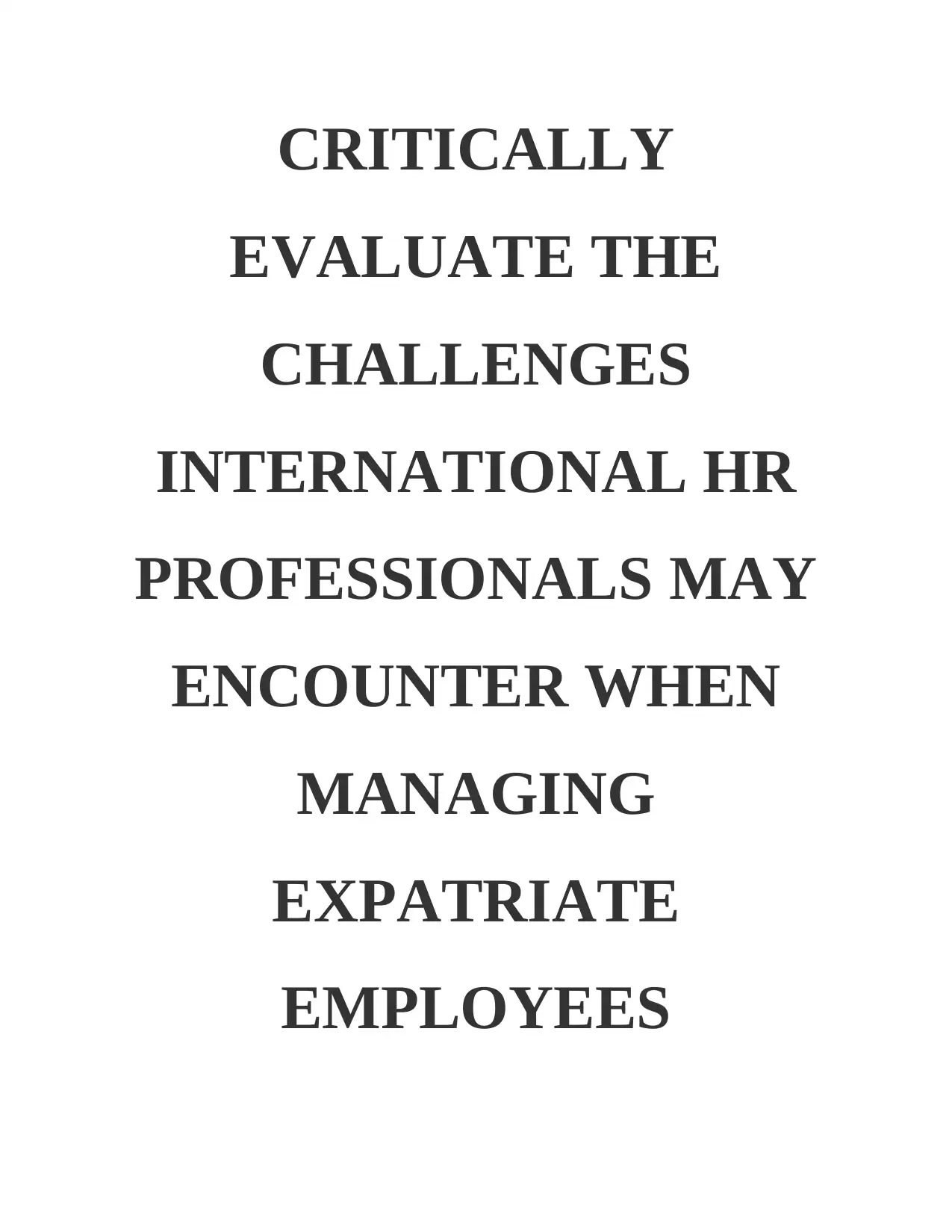
CRITICALLY
EVALUATE THE
CHALLENGES
INTERNATIONAL HR
PROFESSIONALS MAY
ENCOUNTER WHEN
MANAGING
EXPATRIATE
EMPLOYEES
EVALUATE THE
CHALLENGES
INTERNATIONAL HR
PROFESSIONALS MAY
ENCOUNTER WHEN
MANAGING
EXPATRIATE
EMPLOYEES
Paraphrase This Document
Need a fresh take? Get an instant paraphrase of this document with our AI Paraphraser
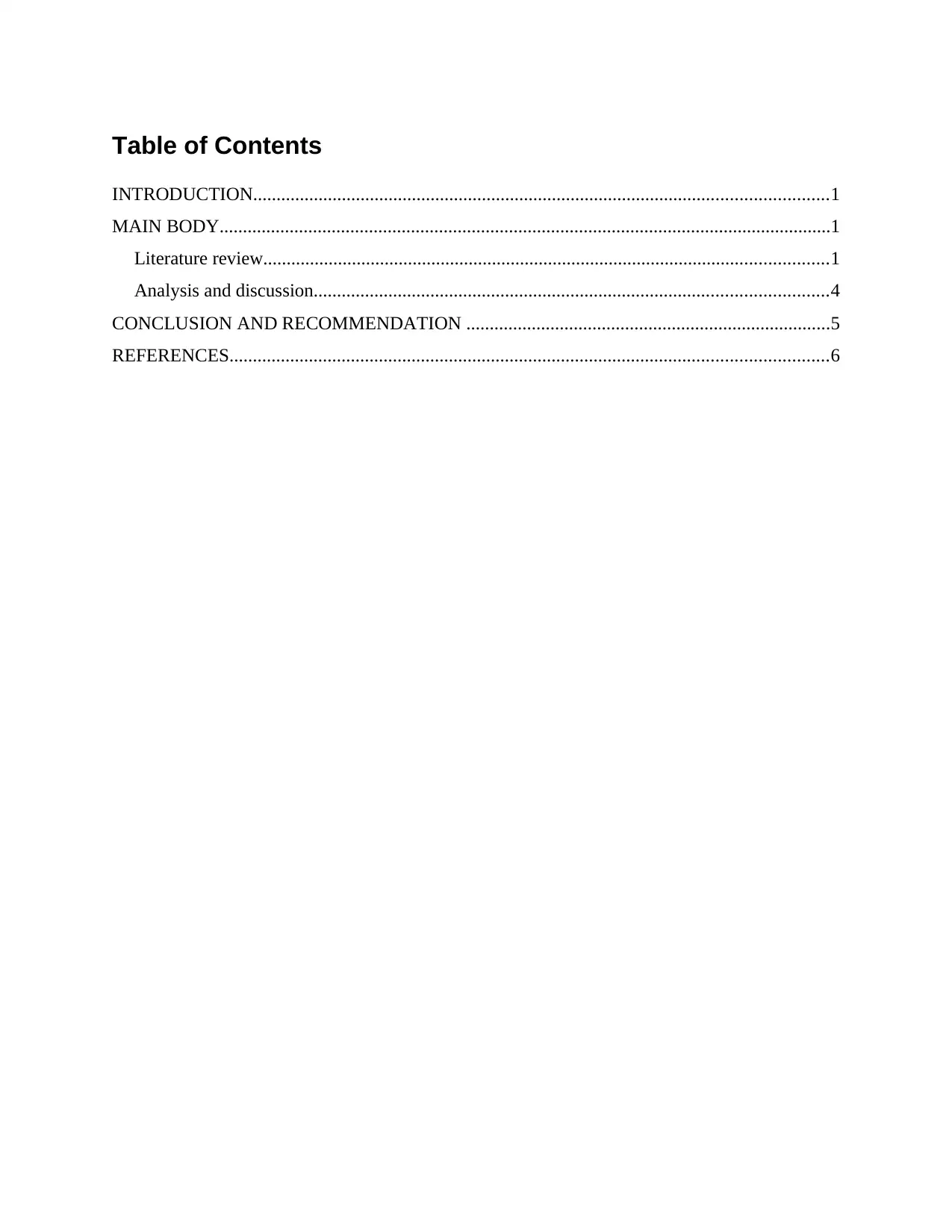
Table of Contents
INTRODUCTION...........................................................................................................................1
MAIN BODY...................................................................................................................................1
Literature review.........................................................................................................................1
Analysis and discussion..............................................................................................................4
CONCLUSION AND RECOMMENDATION ..............................................................................5
REFERENCES................................................................................................................................6
INTRODUCTION...........................................................................................................................1
MAIN BODY...................................................................................................................................1
Literature review.........................................................................................................................1
Analysis and discussion..............................................................................................................4
CONCLUSION AND RECOMMENDATION ..............................................................................5
REFERENCES................................................................................................................................6
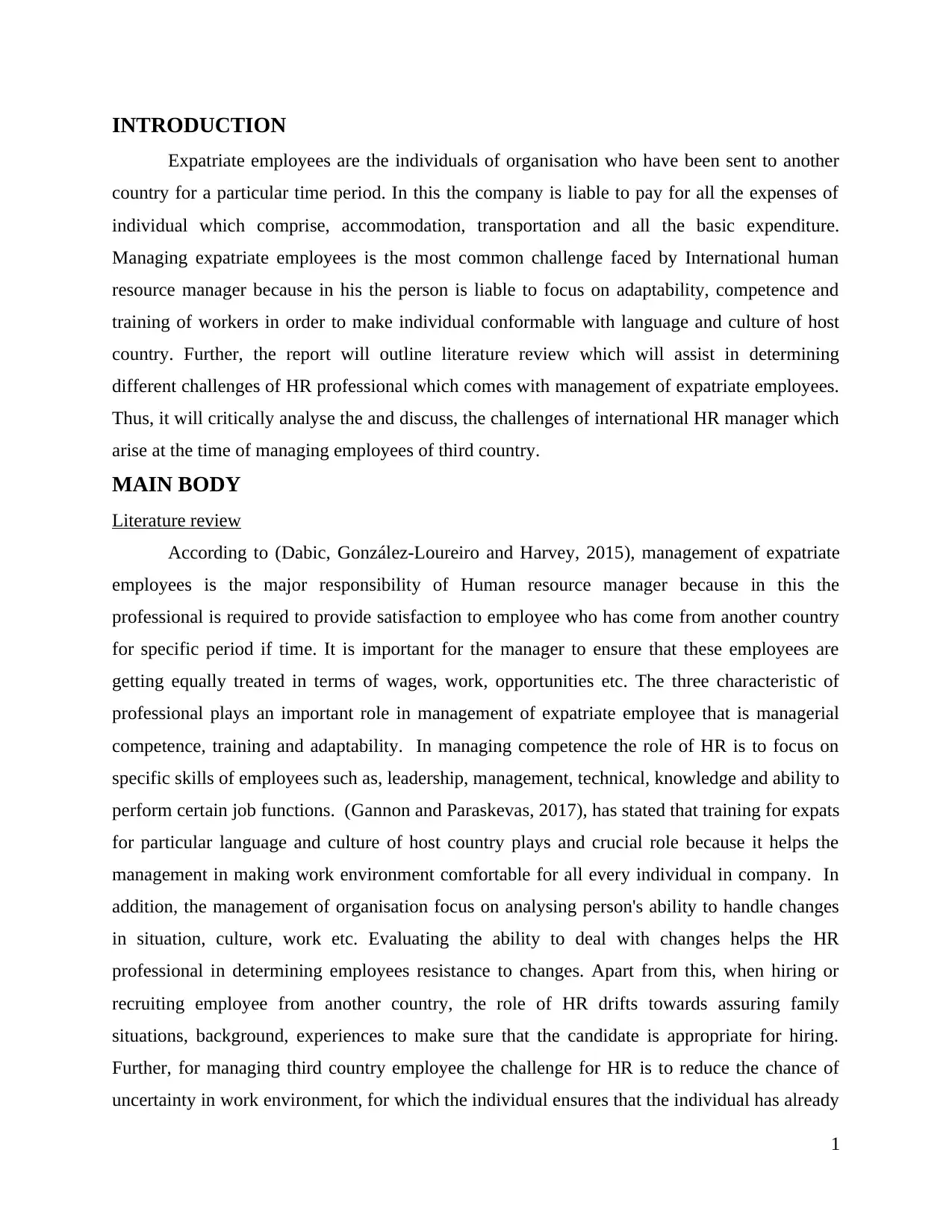
INTRODUCTION
Expatriate employees are the individuals of organisation who have been sent to another
country for a particular time period. In this the company is liable to pay for all the expenses of
individual which comprise, accommodation, transportation and all the basic expenditure.
Managing expatriate employees is the most common challenge faced by International human
resource manager because in his the person is liable to focus on adaptability, competence and
training of workers in order to make individual conformable with language and culture of host
country. Further, the report will outline literature review which will assist in determining
different challenges of HR professional which comes with management of expatriate employees.
Thus, it will critically analyse the and discuss, the challenges of international HR manager which
arise at the time of managing employees of third country.
MAIN BODY
Literature review
According to (Dabic, González-Loureiro and Harvey, 2015), management of expatriate
employees is the major responsibility of Human resource manager because in this the
professional is required to provide satisfaction to employee who has come from another country
for specific period if time. It is important for the manager to ensure that these employees are
getting equally treated in terms of wages, work, opportunities etc. The three characteristic of
professional plays an important role in management of expatriate employee that is managerial
competence, training and adaptability. In managing competence the role of HR is to focus on
specific skills of employees such as, leadership, management, technical, knowledge and ability to
perform certain job functions. (Gannon and Paraskevas, 2017), has stated that training for expats
for particular language and culture of host country plays and crucial role because it helps the
management in making work environment comfortable for all every individual in company. In
addition, the management of organisation focus on analysing person's ability to handle changes
in situation, culture, work etc. Evaluating the ability to deal with changes helps the HR
professional in determining employees resistance to changes. Apart from this, when hiring or
recruiting employee from another country, the role of HR drifts towards assuring family
situations, background, experiences to make sure that the candidate is appropriate for hiring.
Further, for managing third country employee the challenge for HR is to reduce the chance of
uncertainty in work environment, for which the individual ensures that the individual has already
1
Expatriate employees are the individuals of organisation who have been sent to another
country for a particular time period. In this the company is liable to pay for all the expenses of
individual which comprise, accommodation, transportation and all the basic expenditure.
Managing expatriate employees is the most common challenge faced by International human
resource manager because in his the person is liable to focus on adaptability, competence and
training of workers in order to make individual conformable with language and culture of host
country. Further, the report will outline literature review which will assist in determining
different challenges of HR professional which comes with management of expatriate employees.
Thus, it will critically analyse the and discuss, the challenges of international HR manager which
arise at the time of managing employees of third country.
MAIN BODY
Literature review
According to (Dabic, González-Loureiro and Harvey, 2015), management of expatriate
employees is the major responsibility of Human resource manager because in this the
professional is required to provide satisfaction to employee who has come from another country
for specific period if time. It is important for the manager to ensure that these employees are
getting equally treated in terms of wages, work, opportunities etc. The three characteristic of
professional plays an important role in management of expatriate employee that is managerial
competence, training and adaptability. In managing competence the role of HR is to focus on
specific skills of employees such as, leadership, management, technical, knowledge and ability to
perform certain job functions. (Gannon and Paraskevas, 2017), has stated that training for expats
for particular language and culture of host country plays and crucial role because it helps the
management in making work environment comfortable for all every individual in company. In
addition, the management of organisation focus on analysing person's ability to handle changes
in situation, culture, work etc. Evaluating the ability to deal with changes helps the HR
professional in determining employees resistance to changes. Apart from this, when hiring or
recruiting employee from another country, the role of HR drifts towards assuring family
situations, background, experiences to make sure that the candidate is appropriate for hiring.
Further, for managing third country employee the challenge for HR is to reduce the chance of
uncertainty in work environment, for which the individual ensures that the individual has already
1
⊘ This is a preview!⊘
Do you want full access?
Subscribe today to unlock all pages.

Trusted by 1+ million students worldwide
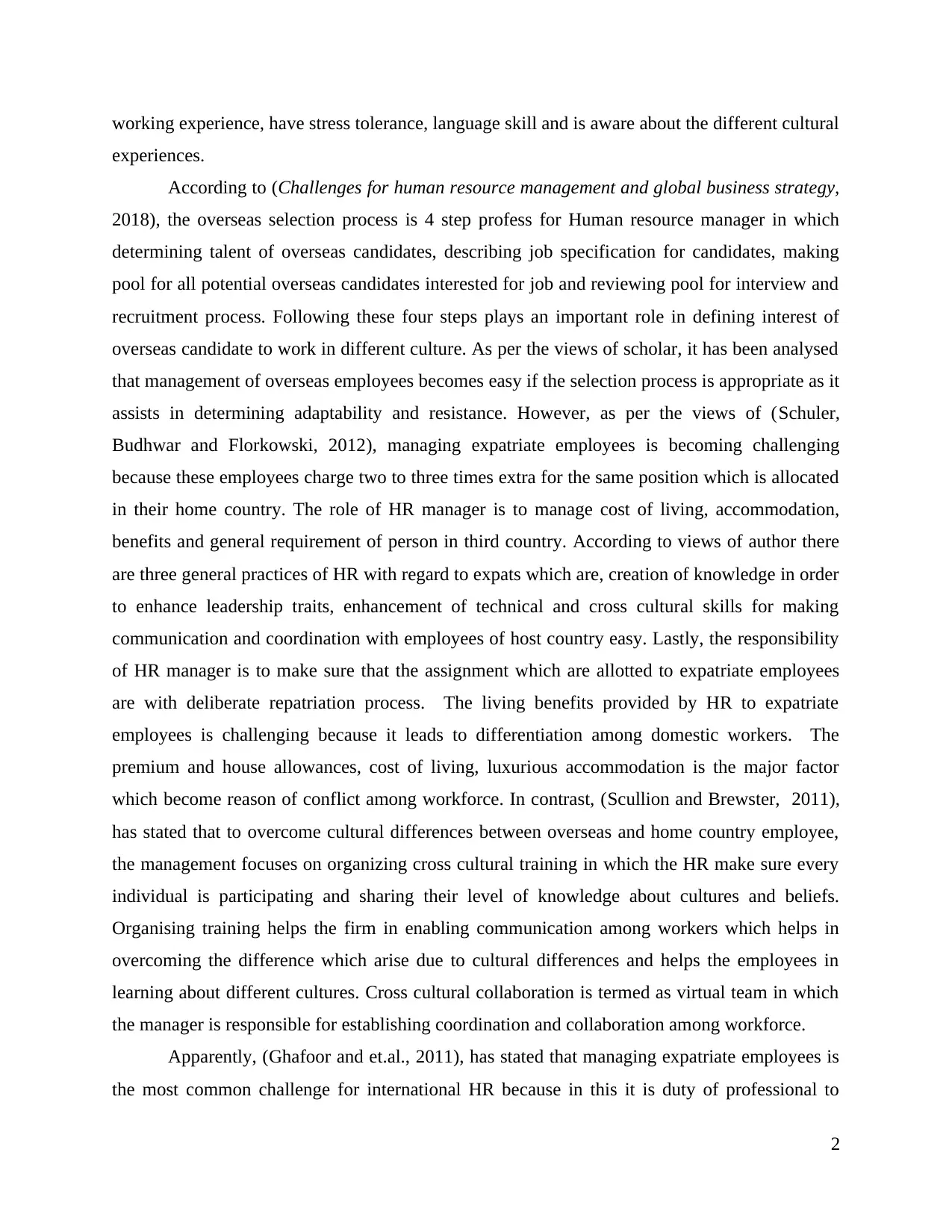
working experience, have stress tolerance, language skill and is aware about the different cultural
experiences.
According to (Challenges for human resource management and global business strategy,
2018), the overseas selection process is 4 step profess for Human resource manager in which
determining talent of overseas candidates, describing job specification for candidates, making
pool for all potential overseas candidates interested for job and reviewing pool for interview and
recruitment process. Following these four steps plays an important role in defining interest of
overseas candidate to work in different culture. As per the views of scholar, it has been analysed
that management of overseas employees becomes easy if the selection process is appropriate as it
assists in determining adaptability and resistance. However, as per the views of (Schuler,
Budhwar and Florkowski, 2012), managing expatriate employees is becoming challenging
because these employees charge two to three times extra for the same position which is allocated
in their home country. The role of HR manager is to manage cost of living, accommodation,
benefits and general requirement of person in third country. According to views of author there
are three general practices of HR with regard to expats which are, creation of knowledge in order
to enhance leadership traits, enhancement of technical and cross cultural skills for making
communication and coordination with employees of host country easy. Lastly, the responsibility
of HR manager is to make sure that the assignment which are allotted to expatriate employees
are with deliberate repatriation process. The living benefits provided by HR to expatriate
employees is challenging because it leads to differentiation among domestic workers. The
premium and house allowances, cost of living, luxurious accommodation is the major factor
which become reason of conflict among workforce. In contrast, (Scullion and Brewster, 2011),
has stated that to overcome cultural differences between overseas and home country employee,
the management focuses on organizing cross cultural training in which the HR make sure every
individual is participating and sharing their level of knowledge about cultures and beliefs.
Organising training helps the firm in enabling communication among workers which helps in
overcoming the difference which arise due to cultural differences and helps the employees in
learning about different cultures. Cross cultural collaboration is termed as virtual team in which
the manager is responsible for establishing coordination and collaboration among workforce.
Apparently, (Ghafoor and et.al., 2011), has stated that managing expatriate employees is
the most common challenge for international HR because in this it is duty of professional to
2
experiences.
According to (Challenges for human resource management and global business strategy,
2018), the overseas selection process is 4 step profess for Human resource manager in which
determining talent of overseas candidates, describing job specification for candidates, making
pool for all potential overseas candidates interested for job and reviewing pool for interview and
recruitment process. Following these four steps plays an important role in defining interest of
overseas candidate to work in different culture. As per the views of scholar, it has been analysed
that management of overseas employees becomes easy if the selection process is appropriate as it
assists in determining adaptability and resistance. However, as per the views of (Schuler,
Budhwar and Florkowski, 2012), managing expatriate employees is becoming challenging
because these employees charge two to three times extra for the same position which is allocated
in their home country. The role of HR manager is to manage cost of living, accommodation,
benefits and general requirement of person in third country. According to views of author there
are three general practices of HR with regard to expats which are, creation of knowledge in order
to enhance leadership traits, enhancement of technical and cross cultural skills for making
communication and coordination with employees of host country easy. Lastly, the responsibility
of HR manager is to make sure that the assignment which are allotted to expatriate employees
are with deliberate repatriation process. The living benefits provided by HR to expatriate
employees is challenging because it leads to differentiation among domestic workers. The
premium and house allowances, cost of living, luxurious accommodation is the major factor
which become reason of conflict among workforce. In contrast, (Scullion and Brewster, 2011),
has stated that to overcome cultural differences between overseas and home country employee,
the management focuses on organizing cross cultural training in which the HR make sure every
individual is participating and sharing their level of knowledge about cultures and beliefs.
Organising training helps the firm in enabling communication among workers which helps in
overcoming the difference which arise due to cultural differences and helps the employees in
learning about different cultures. Cross cultural collaboration is termed as virtual team in which
the manager is responsible for establishing coordination and collaboration among workforce.
Apparently, (Ghafoor and et.al., 2011), has stated that managing expatriate employees is
the most common challenge for international HR because in this it is duty of professional to
2
Paraphrase This Document
Need a fresh take? Get an instant paraphrase of this document with our AI Paraphraser
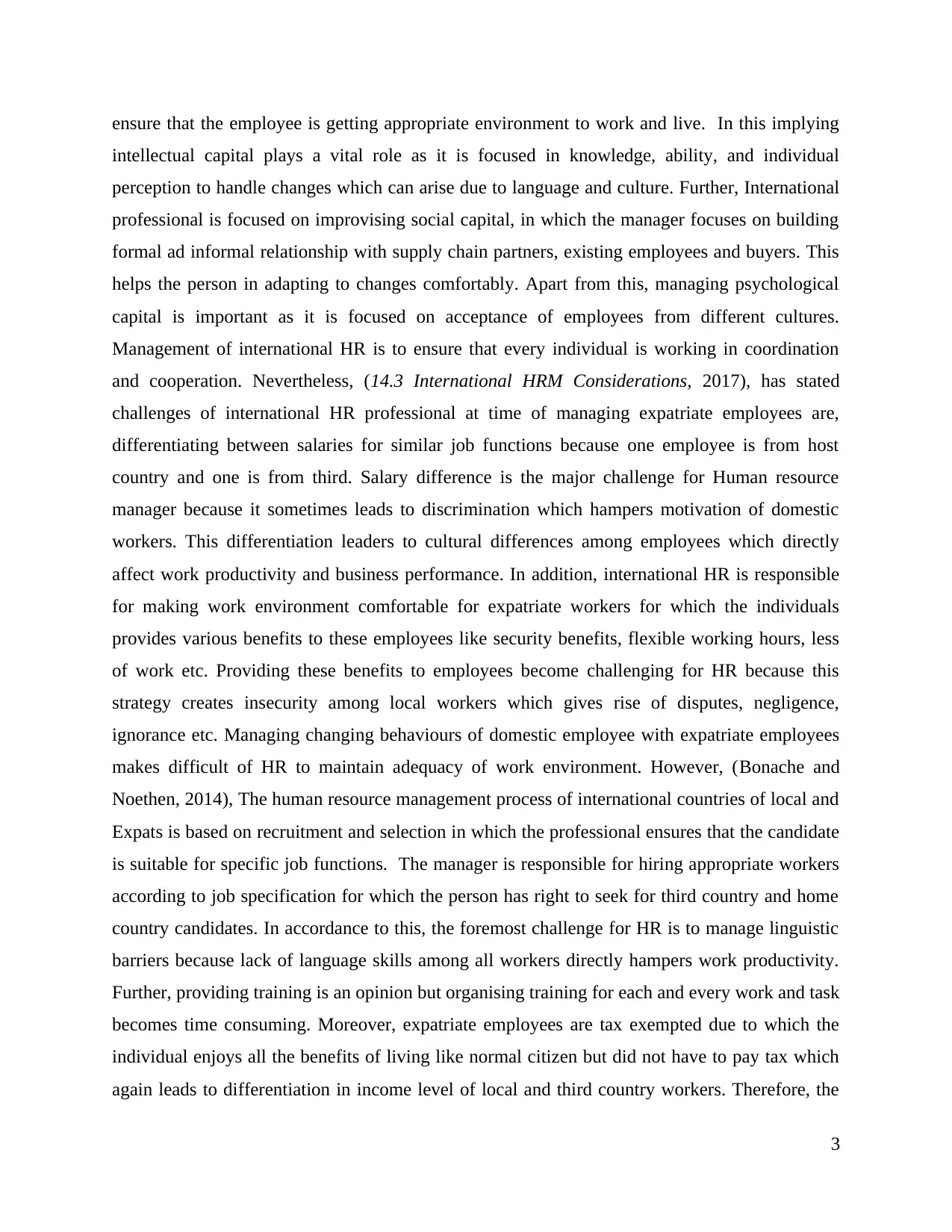
ensure that the employee is getting appropriate environment to work and live. In this implying
intellectual capital plays a vital role as it is focused in knowledge, ability, and individual
perception to handle changes which can arise due to language and culture. Further, International
professional is focused on improvising social capital, in which the manager focuses on building
formal ad informal relationship with supply chain partners, existing employees and buyers. This
helps the person in adapting to changes comfortably. Apart from this, managing psychological
capital is important as it is focused on acceptance of employees from different cultures.
Management of international HR is to ensure that every individual is working in coordination
and cooperation. Nevertheless, (14.3 International HRM Considerations, 2017), has stated
challenges of international HR professional at time of managing expatriate employees are,
differentiating between salaries for similar job functions because one employee is from host
country and one is from third. Salary difference is the major challenge for Human resource
manager because it sometimes leads to discrimination which hampers motivation of domestic
workers. This differentiation leaders to cultural differences among employees which directly
affect work productivity and business performance. In addition, international HR is responsible
for making work environment comfortable for expatriate workers for which the individuals
provides various benefits to these employees like security benefits, flexible working hours, less
of work etc. Providing these benefits to employees become challenging for HR because this
strategy creates insecurity among local workers which gives rise of disputes, negligence,
ignorance etc. Managing changing behaviours of domestic employee with expatriate employees
makes difficult of HR to maintain adequacy of work environment. However, (Bonache and
Noethen, 2014), The human resource management process of international countries of local and
Expats is based on recruitment and selection in which the professional ensures that the candidate
is suitable for specific job functions. The manager is responsible for hiring appropriate workers
according to job specification for which the person has right to seek for third country and home
country candidates. In accordance to this, the foremost challenge for HR is to manage linguistic
barriers because lack of language skills among all workers directly hampers work productivity.
Further, providing training is an opinion but organising training for each and every work and task
becomes time consuming. Moreover, expatriate employees are tax exempted due to which the
individual enjoys all the benefits of living like normal citizen but did not have to pay tax which
again leads to differentiation in income level of local and third country workers. Therefore, the
3
intellectual capital plays a vital role as it is focused in knowledge, ability, and individual
perception to handle changes which can arise due to language and culture. Further, International
professional is focused on improvising social capital, in which the manager focuses on building
formal ad informal relationship with supply chain partners, existing employees and buyers. This
helps the person in adapting to changes comfortably. Apart from this, managing psychological
capital is important as it is focused on acceptance of employees from different cultures.
Management of international HR is to ensure that every individual is working in coordination
and cooperation. Nevertheless, (14.3 International HRM Considerations, 2017), has stated
challenges of international HR professional at time of managing expatriate employees are,
differentiating between salaries for similar job functions because one employee is from host
country and one is from third. Salary difference is the major challenge for Human resource
manager because it sometimes leads to discrimination which hampers motivation of domestic
workers. This differentiation leaders to cultural differences among employees which directly
affect work productivity and business performance. In addition, international HR is responsible
for making work environment comfortable for expatriate workers for which the individuals
provides various benefits to these employees like security benefits, flexible working hours, less
of work etc. Providing these benefits to employees become challenging for HR because this
strategy creates insecurity among local workers which gives rise of disputes, negligence,
ignorance etc. Managing changing behaviours of domestic employee with expatriate employees
makes difficult of HR to maintain adequacy of work environment. However, (Bonache and
Noethen, 2014), The human resource management process of international countries of local and
Expats is based on recruitment and selection in which the professional ensures that the candidate
is suitable for specific job functions. The manager is responsible for hiring appropriate workers
according to job specification for which the person has right to seek for third country and home
country candidates. In accordance to this, the foremost challenge for HR is to manage linguistic
barriers because lack of language skills among all workers directly hampers work productivity.
Further, providing training is an opinion but organising training for each and every work and task
becomes time consuming. Moreover, expatriate employees are tax exempted due to which the
individual enjoys all the benefits of living like normal citizen but did not have to pay tax which
again leads to differentiation in income level of local and third country workers. Therefore, the
3
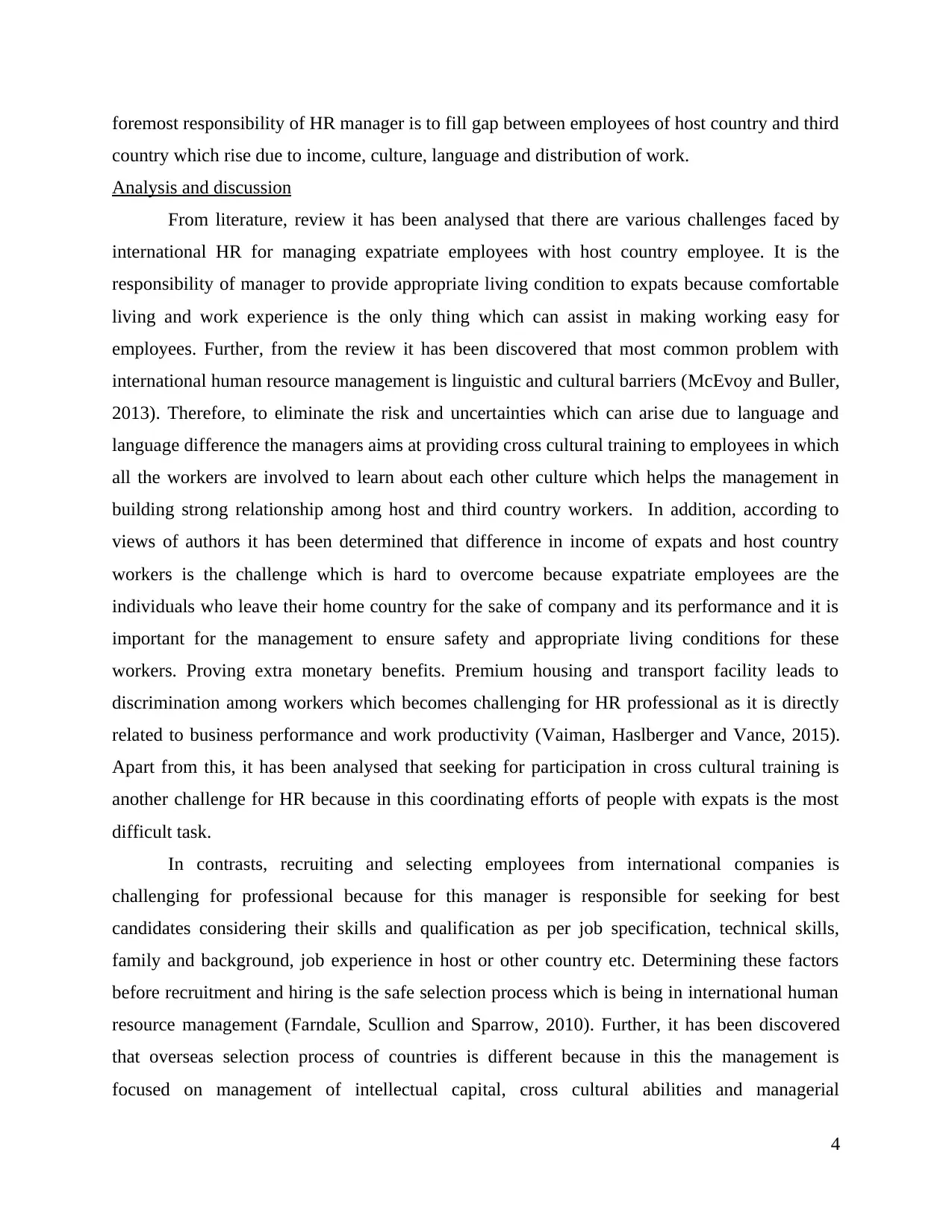
foremost responsibility of HR manager is to fill gap between employees of host country and third
country which rise due to income, culture, language and distribution of work.
Analysis and discussion
From literature, review it has been analysed that there are various challenges faced by
international HR for managing expatriate employees with host country employee. It is the
responsibility of manager to provide appropriate living condition to expats because comfortable
living and work experience is the only thing which can assist in making working easy for
employees. Further, from the review it has been discovered that most common problem with
international human resource management is linguistic and cultural barriers (McEvoy and Buller,
2013). Therefore, to eliminate the risk and uncertainties which can arise due to language and
language difference the managers aims at providing cross cultural training to employees in which
all the workers are involved to learn about each other culture which helps the management in
building strong relationship among host and third country workers. In addition, according to
views of authors it has been determined that difference in income of expats and host country
workers is the challenge which is hard to overcome because expatriate employees are the
individuals who leave their home country for the sake of company and its performance and it is
important for the management to ensure safety and appropriate living conditions for these
workers. Proving extra monetary benefits. Premium housing and transport facility leads to
discrimination among workers which becomes challenging for HR professional as it is directly
related to business performance and work productivity (Vaiman, Haslberger and Vance, 2015).
Apart from this, it has been analysed that seeking for participation in cross cultural training is
another challenge for HR because in this coordinating efforts of people with expats is the most
difficult task.
In contrasts, recruiting and selecting employees from international companies is
challenging for professional because for this manager is responsible for seeking for best
candidates considering their skills and qualification as per job specification, technical skills,
family and background, job experience in host or other country etc. Determining these factors
before recruitment and hiring is the safe selection process which is being in international human
resource management (Farndale, Scullion and Sparrow, 2010). Further, it has been discovered
that overseas selection process of countries is different because in this the management is
focused on management of intellectual capital, cross cultural abilities and managerial
4
country which rise due to income, culture, language and distribution of work.
Analysis and discussion
From literature, review it has been analysed that there are various challenges faced by
international HR for managing expatriate employees with host country employee. It is the
responsibility of manager to provide appropriate living condition to expats because comfortable
living and work experience is the only thing which can assist in making working easy for
employees. Further, from the review it has been discovered that most common problem with
international human resource management is linguistic and cultural barriers (McEvoy and Buller,
2013). Therefore, to eliminate the risk and uncertainties which can arise due to language and
language difference the managers aims at providing cross cultural training to employees in which
all the workers are involved to learn about each other culture which helps the management in
building strong relationship among host and third country workers. In addition, according to
views of authors it has been determined that difference in income of expats and host country
workers is the challenge which is hard to overcome because expatriate employees are the
individuals who leave their home country for the sake of company and its performance and it is
important for the management to ensure safety and appropriate living conditions for these
workers. Proving extra monetary benefits. Premium housing and transport facility leads to
discrimination among workers which becomes challenging for HR professional as it is directly
related to business performance and work productivity (Vaiman, Haslberger and Vance, 2015).
Apart from this, it has been analysed that seeking for participation in cross cultural training is
another challenge for HR because in this coordinating efforts of people with expats is the most
difficult task.
In contrasts, recruiting and selecting employees from international companies is
challenging for professional because for this manager is responsible for seeking for best
candidates considering their skills and qualification as per job specification, technical skills,
family and background, job experience in host or other country etc. Determining these factors
before recruitment and hiring is the safe selection process which is being in international human
resource management (Farndale, Scullion and Sparrow, 2010). Further, it has been discovered
that overseas selection process of countries is different because in this the management is
focused on management of intellectual capital, cross cultural abilities and managerial
4
⊘ This is a preview!⊘
Do you want full access?
Subscribe today to unlock all pages.

Trusted by 1+ million students worldwide
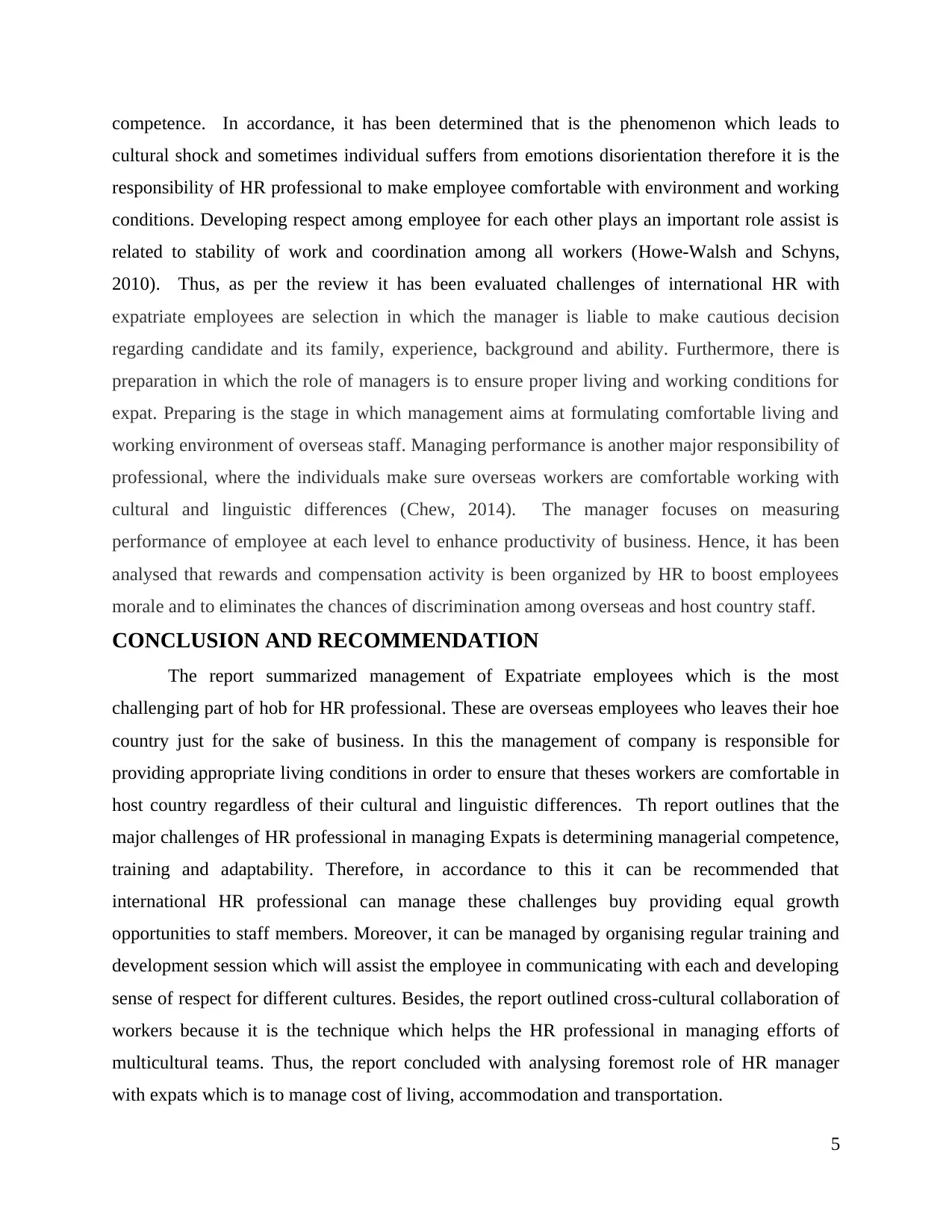
competence. In accordance, it has been determined that is the phenomenon which leads to
cultural shock and sometimes individual suffers from emotions disorientation therefore it is the
responsibility of HR professional to make employee comfortable with environment and working
conditions. Developing respect among employee for each other plays an important role assist is
related to stability of work and coordination among all workers (Howe-Walsh and Schyns,
2010). Thus, as per the review it has been evaluated challenges of international HR with
expatriate employees are selection in which the manager is liable to make cautious decision
regarding candidate and its family, experience, background and ability. Furthermore, there is
preparation in which the role of managers is to ensure proper living and working conditions for
expat. Preparing is the stage in which management aims at formulating comfortable living and
working environment of overseas staff. Managing performance is another major responsibility of
professional, where the individuals make sure overseas workers are comfortable working with
cultural and linguistic differences (Chew, 2014). The manager focuses on measuring
performance of employee at each level to enhance productivity of business. Hence, it has been
analysed that rewards and compensation activity is been organized by HR to boost employees
morale and to eliminates the chances of discrimination among overseas and host country staff.
CONCLUSION AND RECOMMENDATION
The report summarized management of Expatriate employees which is the most
challenging part of hob for HR professional. These are overseas employees who leaves their hoe
country just for the sake of business. In this the management of company is responsible for
providing appropriate living conditions in order to ensure that theses workers are comfortable in
host country regardless of their cultural and linguistic differences. Th report outlines that the
major challenges of HR professional in managing Expats is determining managerial competence,
training and adaptability. Therefore, in accordance to this it can be recommended that
international HR professional can manage these challenges buy providing equal growth
opportunities to staff members. Moreover, it can be managed by organising regular training and
development session which will assist the employee in communicating with each and developing
sense of respect for different cultures. Besides, the report outlined cross-cultural collaboration of
workers because it is the technique which helps the HR professional in managing efforts of
multicultural teams. Thus, the report concluded with analysing foremost role of HR manager
with expats which is to manage cost of living, accommodation and transportation.
5
cultural shock and sometimes individual suffers from emotions disorientation therefore it is the
responsibility of HR professional to make employee comfortable with environment and working
conditions. Developing respect among employee for each other plays an important role assist is
related to stability of work and coordination among all workers (Howe-Walsh and Schyns,
2010). Thus, as per the review it has been evaluated challenges of international HR with
expatriate employees are selection in which the manager is liable to make cautious decision
regarding candidate and its family, experience, background and ability. Furthermore, there is
preparation in which the role of managers is to ensure proper living and working conditions for
expat. Preparing is the stage in which management aims at formulating comfortable living and
working environment of overseas staff. Managing performance is another major responsibility of
professional, where the individuals make sure overseas workers are comfortable working with
cultural and linguistic differences (Chew, 2014). The manager focuses on measuring
performance of employee at each level to enhance productivity of business. Hence, it has been
analysed that rewards and compensation activity is been organized by HR to boost employees
morale and to eliminates the chances of discrimination among overseas and host country staff.
CONCLUSION AND RECOMMENDATION
The report summarized management of Expatriate employees which is the most
challenging part of hob for HR professional. These are overseas employees who leaves their hoe
country just for the sake of business. In this the management of company is responsible for
providing appropriate living conditions in order to ensure that theses workers are comfortable in
host country regardless of their cultural and linguistic differences. Th report outlines that the
major challenges of HR professional in managing Expats is determining managerial competence,
training and adaptability. Therefore, in accordance to this it can be recommended that
international HR professional can manage these challenges buy providing equal growth
opportunities to staff members. Moreover, it can be managed by organising regular training and
development session which will assist the employee in communicating with each and developing
sense of respect for different cultures. Besides, the report outlined cross-cultural collaboration of
workers because it is the technique which helps the HR professional in managing efforts of
multicultural teams. Thus, the report concluded with analysing foremost role of HR manager
with expats which is to manage cost of living, accommodation and transportation.
5
Paraphrase This Document
Need a fresh take? Get an instant paraphrase of this document with our AI Paraphraser

REFERENCES
Books and journals
Bonache, J. and Noethen, D., 2014. The impact of individual performance on organizational
success and its implications for the management of expatriates. The International
Journal of Human Resource Management. 25(14). pp.1960-1977.
Chew, J., 2014. Managing MNC expatriates through crises: A challenge for international human
resource management. Research and practice in human resource management. 12(2).
pp.1-30.
Dabic, M., González-Loureiro, M. and Harvey, M., 2015. Evolving research on expatriates: what
is ‘known’after four decades (1970–2012). The International Journal of Human
Resource Management. 26(3). pp.316-337.
Farndale, E., Scullion, H. and Sparrow, P., 2010. The role of the corporate HR function in global
talent management. Journal of world business. 45(2). pp.161-168.
Gannon, J. and Paraskevas, A., 2017. In the line of fire: Managing expatriates in hostile
environments. The International Journal of Human Resource Management. pp.1-32.
Ghafoor, S. and et.al., 2011. Evaluation of expatriates performance and their training on
international assignments. Interdisciplinary Journal of Contemporary Research in
Business. 3(5). pp.335-351.
Howe-Walsh, L. and Schyns, B., 2010. Self-initiated expatriation: implications for HRM. The
International Journal of Human Resource Management. 21(2). pp.260-273.
McEvoy, G.M. and Buller, P.F., 2013. Research for practice: The management of expatriates.
Thunderbird International Business Review. 55(2). pp.213-226.
Schuler, R.S., Budhwar, P.S. and Florkowski, G.W., 2012. International human resource
management: review and critique. International Journal of Management Reviews. 4(1).
pp.41-70.
Scullion, H. and Brewster, C., 2011. The management of expatriates: messages from Europe?.
Journal of World Business. 36(4). pp.346-365.
Vaiman, V., Haslberger, A. and Vance, C.M., 2015. Recognizing the important role of self-
initiated expatriates in effective global talent management. Human Resource
Management Review. 25(3). pp.280-286.
6
Books and journals
Bonache, J. and Noethen, D., 2014. The impact of individual performance on organizational
success and its implications for the management of expatriates. The International
Journal of Human Resource Management. 25(14). pp.1960-1977.
Chew, J., 2014. Managing MNC expatriates through crises: A challenge for international human
resource management. Research and practice in human resource management. 12(2).
pp.1-30.
Dabic, M., González-Loureiro, M. and Harvey, M., 2015. Evolving research on expatriates: what
is ‘known’after four decades (1970–2012). The International Journal of Human
Resource Management. 26(3). pp.316-337.
Farndale, E., Scullion, H. and Sparrow, P., 2010. The role of the corporate HR function in global
talent management. Journal of world business. 45(2). pp.161-168.
Gannon, J. and Paraskevas, A., 2017. In the line of fire: Managing expatriates in hostile
environments. The International Journal of Human Resource Management. pp.1-32.
Ghafoor, S. and et.al., 2011. Evaluation of expatriates performance and their training on
international assignments. Interdisciplinary Journal of Contemporary Research in
Business. 3(5). pp.335-351.
Howe-Walsh, L. and Schyns, B., 2010. Self-initiated expatriation: implications for HRM. The
International Journal of Human Resource Management. 21(2). pp.260-273.
McEvoy, G.M. and Buller, P.F., 2013. Research for practice: The management of expatriates.
Thunderbird International Business Review. 55(2). pp.213-226.
Schuler, R.S., Budhwar, P.S. and Florkowski, G.W., 2012. International human resource
management: review and critique. International Journal of Management Reviews. 4(1).
pp.41-70.
Scullion, H. and Brewster, C., 2011. The management of expatriates: messages from Europe?.
Journal of World Business. 36(4). pp.346-365.
Vaiman, V., Haslberger, A. and Vance, C.M., 2015. Recognizing the important role of self-
initiated expatriates in effective global talent management. Human Resource
Management Review. 25(3). pp.280-286.
6
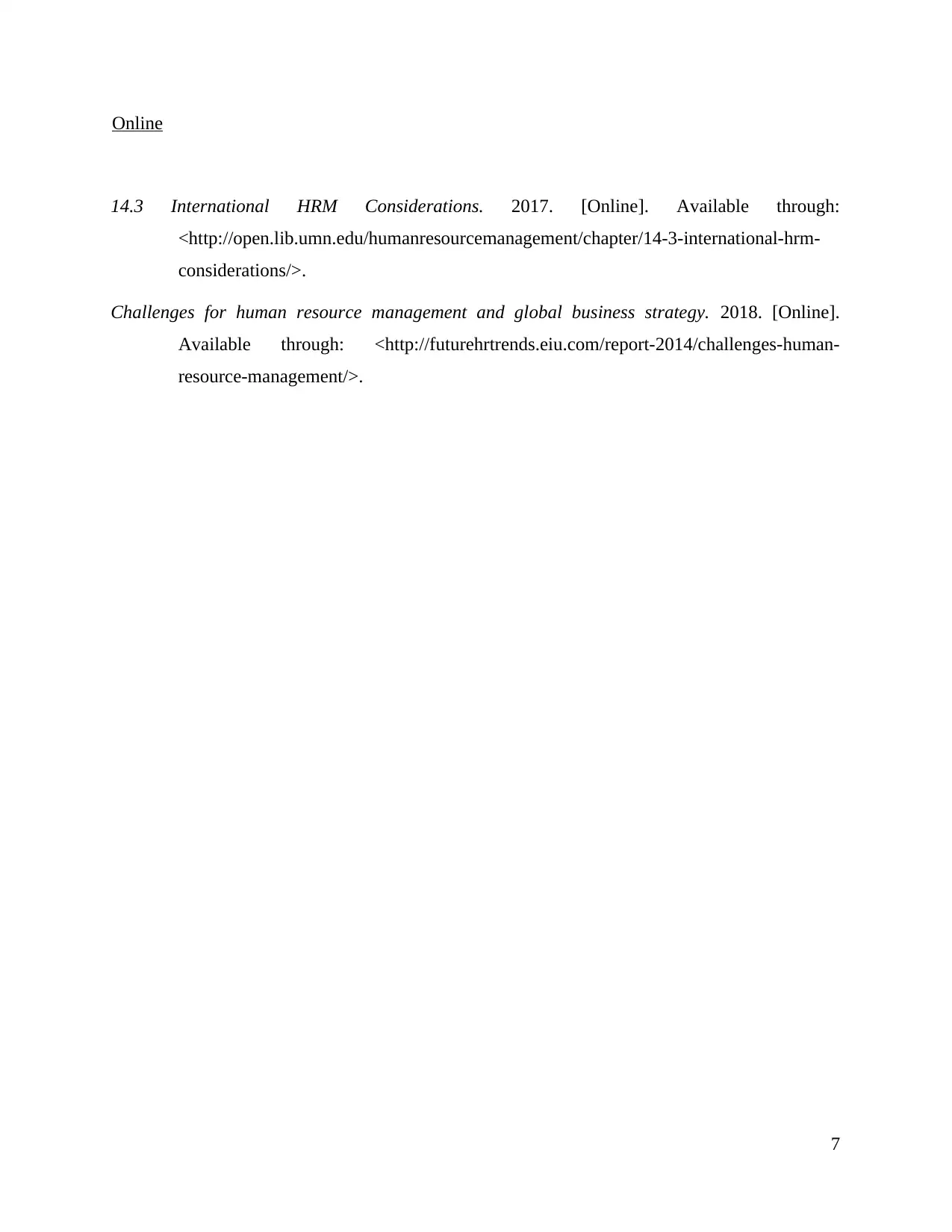
Online
14.3 International HRM Considerations. 2017. [Online]. Available through:
<http://open.lib.umn.edu/humanresourcemanagement/chapter/14-3-international-hrm-
considerations/>.
Challenges for human resource management and global business strategy. 2018. [Online].
Available through: <http://futurehrtrends.eiu.com/report-2014/challenges-human-
resource-management/>.
7
14.3 International HRM Considerations. 2017. [Online]. Available through:
<http://open.lib.umn.edu/humanresourcemanagement/chapter/14-3-international-hrm-
considerations/>.
Challenges for human resource management and global business strategy. 2018. [Online].
Available through: <http://futurehrtrends.eiu.com/report-2014/challenges-human-
resource-management/>.
7
⊘ This is a preview!⊘
Do you want full access?
Subscribe today to unlock all pages.

Trusted by 1+ million students worldwide
1 out of 9
Related Documents
Your All-in-One AI-Powered Toolkit for Academic Success.
+13062052269
info@desklib.com
Available 24*7 on WhatsApp / Email
![[object Object]](/_next/static/media/star-bottom.7253800d.svg)
Unlock your academic potential
Copyright © 2020–2026 A2Z Services. All Rights Reserved. Developed and managed by ZUCOL.





